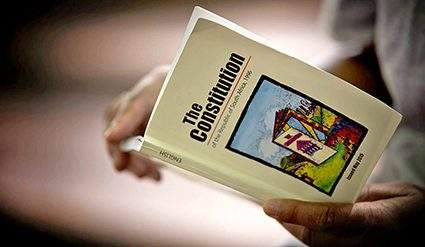The country’s constitution, signed into law by the late and former president Nelson Mandela on December 10, 1996, is embraced by many South Africans – but is also held in derision by others.
But that is to be expected if we are to follow human logic ascribed to Newton’s Third Law, that to every action there is an equal and opposite reaction.
With that in mind, it should not be surprising that there are some, for ideological reasons, who view the country’s constitution with some level of scepticism.
Those who hate the constitution with a passion describe it as a “sell-out” document. With scorn, they see it as euro-centric – which is a shorthand to suggest it is pre-eminently and culturally European, and therefore not serving the interests of the black majority.
There is certainly some level of merit to these assertions. They cannot be dismissed. More than 300 years of colonialism and apartheid, and all kinds of
injustices have been heaped on black people. This may justify the scepticism some have about the constitution.
Black people have been deeply wounded, and the wounding continues to this day. Scepticism and doubt must be understood. There is no respite for many black people. Life continues to be hard, with cost of living escalating and poverty deepening.
But could such scepticism be justifiable if we read and interpret the constitution without our thoughts being framed or coloured by our ideological biases?
This article seeks to answer these lingering questions. Whether it will succeed, it is hard to know except to allow facts to speak for themselves.
The school of thought that expresses scepticism argue that the constitution needs revamping – that it should reflect African or black ethos or characteristics, and that it should be relatable to the aspirations espoused by the black masses.
In the past, during many years of colonialism and apartheid, the country had a constitution that owed its allegiance to parliamentary sovereignty – which is to say, the legislature could do anything it pleased, and could, for instance, pass unjust laws such as we have had during the colonial and apartheid years, without any fear the oppressive laws could be tested for validity, and if found unconstitutional, reviewed, and even set aside.
To make the point clearer, consider the words of president Paul Kruger of the 19th century as he swore in a new chief justice of the time. “The testing right [of the judiciary] is the principle of the devil, which the devil had introduced into paradise to test God’s word.”
Kruger’s thinking is archaic. It belongs to the dustbin of history of oppressive regime. Surely, those who are opposed to the constitution, this is not what they would subscribe too.
But there are many who oppose the concept of constitutionalism, arguing that it has the tendency to undermine, or subvert the authority of politically elected officials by popular vote, placing limits on the powers conferred to them at the polls.
However, judicial review, exercised by the judiciary, which is another arm of government along the other two government branches – the legislature and the executive – ensures that the laws passed by the legislature pass the constitutional muster, and are constitutionally valid.
An ancient writer, Sir Acton, reminds us that power corrupts, and excessive power tends to corrupt excessively.
By our present, modern-day lexicon, we often invoke the notion that public power, which the legislature, the executive and judiciary and other organs of state exercises, ought to be limited and regulated.
Humans are fallible, and politicians can go rogue, even in constitutional regimes. The constitution, underpinned by the Bill of Rights, ensures that no one acts illegally, and that the rule of law is sacrosanct, and that laws that are bad, unconstitutional and oppressive, are struck off as unconstitutional.
That is the joy of living in a democracy. Imperfect as it may be, but the rights to equality of everyone is guaranteed.
- Mdhlela is a freelance journalist, an Anglican priest, an ex-trade unionist and former editor of the SA Human Rights Commission journals
Follow @SundayWorldZA on Twitter and @sundayworldza on Instagram, or like our Facebook Page, Sunday World, by clicking here for the latest breaking news in South Africa.



